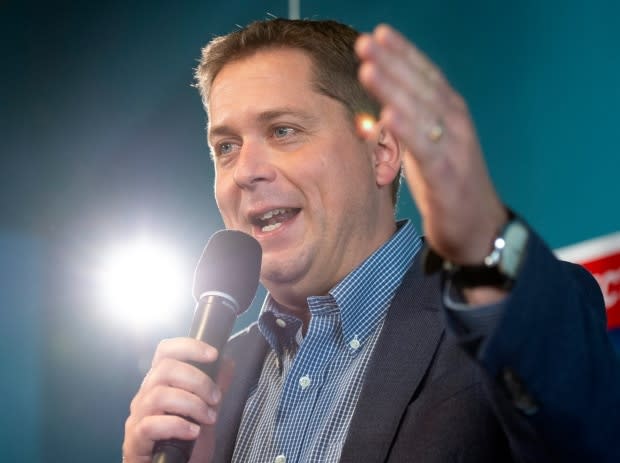Leaders talk financial relief, but Trudeau still quizzed over blackface scandal
Days after the blackface scandal rocked the election campaign, the federal party leaders on Sunday appeared to be looking to move on, rolling out policies they said would put more money in people's pockets.
But Liberal Leader Justin Trudeau, despite two major policy announcements, was again peppered with questions from reporters about the controversial images.
Policies dealing with financial relief, cost-of-living, or so-called "pocketbook" issues have been a common thread throughout the campaign. All leaders have talked about making life easier for families. And little wonder — a survey conducted by CBC News found that that issue was the greatest concern for Canadians heading into this election.
Plans to make life financially easier
Just this week, before the revelations of the brownface and blackface images became international news, the Conservatives, Liberals, NDP and Greens had brought forward proposals, which they claim, would make life financially easier for Canadians.
NDP Leader Jagmeet Singh promised free dental care for households making under $70,000. Trudeau promised a boost to the Canada Child Benefit (CCB) for babies, and a 15-week leave program for adoptive parents. Conservative Leader Andrew Scheer said a Tory government would resurrect a policy of the former Conservative government — tax credits for expenses related to children fitness, sports activities and arts and learning.

Meanwhile, Green Party Elizabeth May, who unveiled her full party platform, promised a Green government would limit credit card interest rates and ATM fees.
And on Sunday, both Singh and Scheer were offering more financial help for some voters. In Canoe Cove, P.E.I., Scheer focused on veterans, promising to help them financially by dealing with the backlog of veterans' benefits applications within two years. Meanwhile, Singh, in Gatineau, Que., promised to add $2.5 billion to the federal government's disaster mitigation fund, money he wants used to build infrastructure that would help protect homes and businesses from floods.
But it was Trudeau who came out on Sunday in Brampton, Ont. with policies hoping to appeal to a wide range of middle-class families — cuts to income taxes and cellphone bills.
Won't pay taxes on first $15,000
He said a Liberal government, if re-elected, would raise the basic personal income tax deduction to $15,000 from the present $12,069 for people earning less than $147,000. That means they would pay no income tax on that first $15,000.
This, he said, would save the average taxpayer $292 every year, while an average family would get $585.
While the NDP and Greens, have instead, focused on raising taxes on corporations, it's the Conservatives and Liberals who have been battling for title of best tax cuts.
Just a week ago, Scheer announced his own tax savings plan, which he said would cut the rate on the lowest income tax bracket to 13.75 per cent from 15 per cent.
Based on the party's calculations, the average single taxpayer would save about $444 a year. A two-income couple earning an average salary would save about $850 a year.

But Trudeau unveiled another pledge on Sunday, one that seemed to target the NDP.
He zoomed in on an expense Canadians love to complain about — cellphone bills. With Canadians reportedly paying some of the highest cellphone costs in the G7, Trudeau announced that if re-elected, his government would cut those bills by 25 per cent over the next two years. That, he said, would save the average family of four up to $976 a year.
The Liberals' proposal took aim at the NDP's plan, which would implement price caps on cellphone and internet bills.
Questions about blackface scandal
Asked how exactly Trudeau, would cut those costs without regulation, the Liberal leader would only say that his government would "engage" with the telecom companies, and that they would face "further competition" if they were unable to achieve those price decreases.
But he was also questioned about the brownface and blackface scandal. Asked by a Reuters reporter just how short-lived the controversy may be, Trudeau suggested that Canadians are more concerned about affordability issues and two of the biggest are taxes and cell phone costs.
Yet he was still asked specific questions about the scandal: Could he say he hasn't worn blackface since 2001? Did he first realize blackface was racist in 2008? Was he reaching out to anybody who might help jog his memory regarding the number of times he has worn blackface?
But he seemed to take all those questions in stride, giving no specifics, instead, saying he has been forthright on this issue, that he will continue to stand against racism, that he was deeply embarrassed but takes responsibility for his actions.


